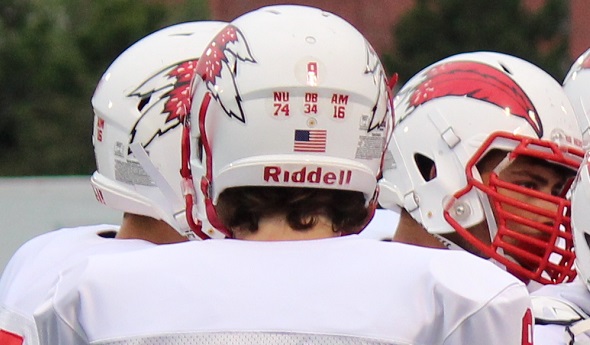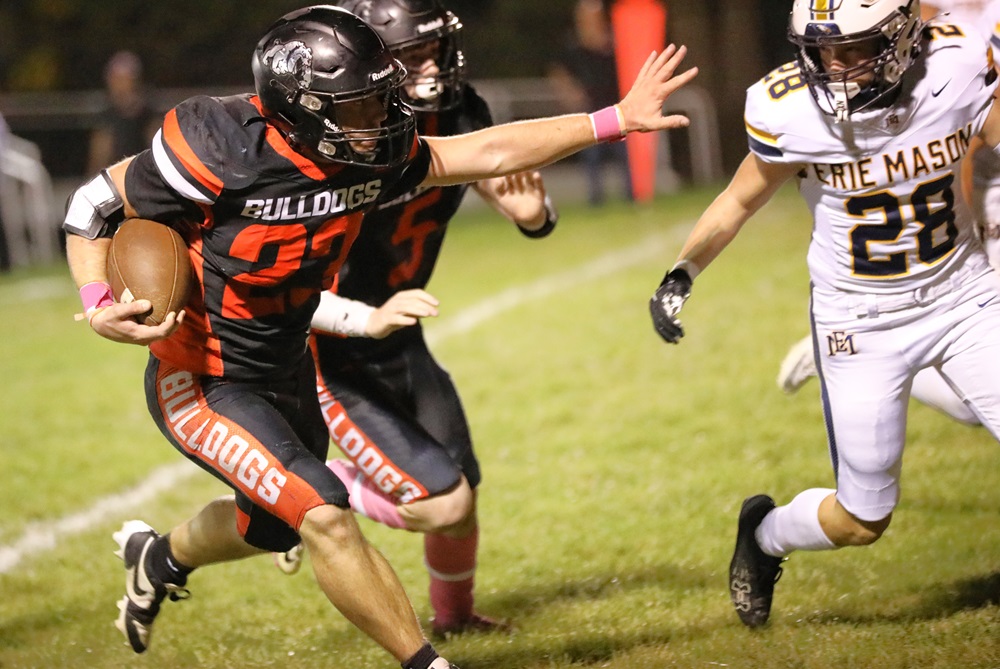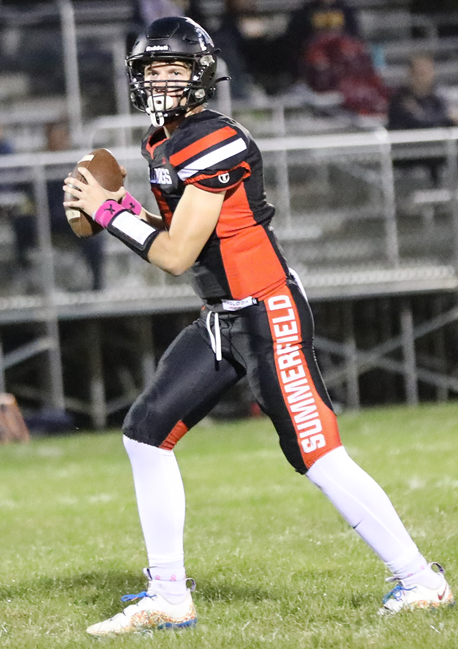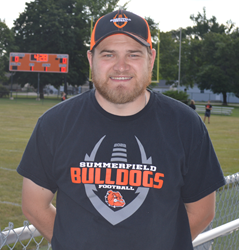
Football Teams Mourn, Regroup, Remember
By
Tom Markowski
Special for Second Half
September 2, 2015
CLINTON TOWNSHIP – A rash of deaths of high school football players in Macomb County and elsewhere in the Detroit area has shaken those communities and the football programs within them.
Three football players at Clinton Township Chippewa Valley have died in the past 16 months. This past May, two players from Sterling Heights Stevenson and one from Utica Ford died in a horrific automobile crash at Stoney Creek Metro Park. Another football player at Southfield High drowned in a swimming pool shortly before the start of practice last month.
 One player at Chippewa Valley died of cancer, another died from injuries suffered as the result of an accident that took place in a home and the third died Aug. 5, five days before the first official day of practice, in an all-terrain vehicle crash that took place in the northeast region of the Lower Peninsula.
One player at Chippewa Valley died of cancer, another died from injuries suffered as the result of an accident that took place in a home and the third died Aug. 5, five days before the first official day of practice, in an all-terrain vehicle crash that took place in the northeast region of the Lower Peninsula.
Chippewa Valley coach Scott Merchant played for coach Al Fracassa at Birmingham Brother Rice and then went on to play at Albion College before becoming a coach. Merchant remains shaken by the tragic events that have befallen his program.
In addition to the deaths of his players, two parents of former players, one only 46 years old, died during this time frame.
“They don’t give out manuals for this,” Merchant said. “It’s taken a lot out of me, personally. I don’t know. I’ve spent so much time away from my family, going to hospitals, going to funeral homes. You’re talking about young people’s lives here.
”I don’t know. I go to church. I believe in God. He has a plan. It’s hard to look a 16- or 17-year-old in their eyes and make sense of it all.”
Coaches coach, but there is so much more they are asked to do. They are expected to be mentors. They are often expected to be father figures. Sometimes they act as counselors, even if it isn’t in their job description. Perhaps most importantly they are leaders. They instruct their coaches and give them responsibilities. Players follow their directives and look to them for guidance.
On top of this, coaches are expected to be successful on the field. And a vast majority accept these responsibilities and a modest financial reward with a smile.
But when one of their players dies while still in high school, coaches must also remain emotionally strong for those who are too young to comprehend the finality.
Words of encouragement and a strong embrace can go a long way in times of trouble.
“We tell them, we’re here for you,” Merchant said. “We love you. We’re all hurting. We tell them there are two options. You can quit and be miserable. Or you can get off the ground and keep their memory alive.”
Nick Ureel was a senior at Chippewa Valley when he died of cancer in April 2014. Ureel played football his first two years but the cancer, which began in his testicles, prevented him from playing his junior and senior years.
Alex Mackmin was 16 years old when he died this May. He played on the junior varsity as a sophomore last season.
Merchant held workouts on Aug. 3 and 4 before letting his players go and enjoy the final few days before the start of practice Aug. 10. Duncan Blair, a senior who would compete for a starting position at linebacker, travelled north on vacation. He died while riding a four-wheel off-road vehicle that struck a tree.
 Coincidentally the Mackmin and Blair families attended the same church in Utica. Both funerals were held at that church.
Coincidentally the Mackmin and Blair families attended the same church in Utica. Both funerals were held at that church.
Blair’s parents rode the fan bus to Wayne State University for Chippewa Valley’s opener against Lake Orion. Rhys Blair runs the concession stand at Chippewa Valley.
The circumstances were much different for the players who died in the crash in early May in northern Macomb County – but it was no less tragic.
Jonathan Manolios and Emanuel Malaj from Stevenson and Michael Wells from Utica Ford were killed in a car crash. All three played varsity football as juniors in 2014. Two other high school students were injured in the crash and both survived. All five were 17 years old at the time of the crash.
Last season was Kevin Frederick’s first as head coach at Stevenson. He was the former head coach at Whittemore-Prescott.
Frederick had never dealt with anything like this before.
“It was devastating,” he said. “We had a meeting with the kids at school and discussed why it happened. There were grief counselors available. I did meet with some of the parents. Some reached out and said their son wasn’t handling it well.
“We warned our kids not to go on social media after. People forget (the students) were very young. There were some very unkind things said on social media. Alcohol was involved. Their mistake cost them their lives. We tell them to think before you get into a car. Think before you take a drink.
“Scott’s circumstances were different. Kids act in a way … it costs them dearly. Some walk away and grow. This time they didn’t walk away.”
Chippewa Valley and Stevenson are members of the Macomb Area Conference Red, and the teams will play Sept. 11 at Stevenson. Both coaches say they will do something to remember those who died.
Chippewa Valley opens its home season a week later against Warren Cousino. Merchant said his players will wear black jerseys instead of their traditional red to remember those who died.
“Football isn’t an escape,” Merchant said. “It’s a distraction. It takes your mind off of it, but it really doesn’t. We have pictures of all three (students) in our locker room. They are there to remind us.”
 Tom Markowski is a columnist and directs website coverage for the State Champs! Sports Network. He previously covered primarily high school sports for the The Detroit News from 1984-2014, focusing on the Detroit area but also contributing to statewide coverage of football and basketball. Contact him at [email protected] with story ideas for Oakland, Macomb and Wayne counties.
Tom Markowski is a columnist and directs website coverage for the State Champs! Sports Network. He previously covered primarily high school sports for the The Detroit News from 1984-2014, focusing on the Detroit area but also contributing to statewide coverage of football and basketball. Contact him at [email protected] with story ideas for Oakland, Macomb and Wayne counties.
PHOTOS: (Top) Chippewa Valley players are wearing the numbers of three deceased teammates on the backs of their helmets this season. (Middle) Coach Scott Merchant addresses his players after last week's win against Lake Orion at Wayne State University.

Sparked by Offense Switch, Summerfield Sets Record-Breaking Scoring Pace
By
Doug Donnelly
Special for MHSAA.com
October 29, 2024
Dylan Szegedi might only be in his second season as a head varsity football coach, but he knows when to pull the plug on an offensive scheme.
 A change from the veer to a version of the gun-T has been the catalyst behind Petersburg-Summerfield’s 8-1 season, the best at the Monroe County school in more than a decade.
A change from the veer to a version of the gun-T has been the catalyst behind Petersburg-Summerfield’s 8-1 season, the best at the Monroe County school in more than a decade.
“I really love the veer. I’ve seen it work very well,” Szegedi said. “It just didn’t work for us. We always say we were trying to put a round peg through a square hole. It just didn’t jell with our guys, and we were smart enough to realize it.”
The Bulldogs went 5-4 last season but missed the playoffs for the second straight. With several second- and third-year starting seniors back, Szegedi decided to change offenses despite having spent nearly all his years coaching the veer. He and his coaching staff started researching offenses and landed on one that is the mastermind of a coach in Alabama that puts a lot of YouTube videos together and travels around the country talking about his offensive concepts.
“This offense is perfect for our guys,” Szegedi said. “It’s a good mix of running and passing. It’s a good mix of spread but still some downhill-style run concepts. It fits our athletes to a T. It is a spread-T concept, wing-T running concepts with a spread flair to it. It was exactly what we needed.”
Heading into Friday’s home Division 8 playoff game against Manchester – the first hosted by Summerfield since 2015 – the Bulldogs are one point shy of the school record for points scored in a season. Since a 20-14 win over Ottawa Lake Whiteford in Week 5, Summerfield has scored 48, 62, 70 and 58 points in victories. The 70 points against Vanlue, Ohio, was a single-game school record.
 “It’s come together seamlessly. The proof is in the pudding. We have done great, and hopefully we will continue to do so,” Szegedi said.
“It’s come together seamlessly. The proof is in the pudding. We have done great, and hopefully we will continue to do so,” Szegedi said.
The new offense suits quarterback Trace Secor much better.
“I like this one,” Secor said. “It fits our style of play and the players we have. It complements us.”
Secor has passed for 1,248 yards and 21 touchdowns.
Senior receiver Tyler Dafoe has 743 yards and 12 touchdowns receiving. Bruising tight end Brenden Myshock has six touchdown receptions, and big-play Eli VanHuysen has caught 18 passes for 391 yards and another six touchdowns.
Senior running back Mitchell Gomulinski has had a tremendous season as well. Through nine games, he has rushed for 1,398 yards, averaging more than nine per carry. He has scored 17 touchdowns.
“Mitchell is he is our emotional leader,” Szegedi said. “He keeps everybody going and is the guy the other people look for to set the example. He’s worked very hard. I’m just proud of what he was able to do.”
The Summerfield defense has been rock-solid too. Since halftime of the Whiteford game, the Bulldogs have allowed just two touchdowns over 18 quarters. Gomulinski has 80 tackles. Dafoe and Gabe Ostrosky have five interceptions apiece.
The biggest win came against Whiteford, which played in MHSAA Finals in 2022 and 2023. It propelled the Bulldogs to the Tri-County Conference championship.
“When we beat Whiteford, that really changed the attitude of a lot of our guys,” Szegedi said. “Not that they didn’t believe before, but after that victory, I think we just started believing even more. It gave them affirmation that if we could beat them, we could hang with anybody. It gave them the belief that, ‘Hey, maybe we are pretty good.’”
The community has rallied behind the team. At a watch party Sunday when the MHSAA released the playoff pairings, about 150 parents, students and other community members met in the high school cafeteria.
 “There is talk about how they are going to decorate the town and decorate the stadium,” Szegedi said. “Last Friday the stadium was packed. That’s the way it should be.”
“There is talk about how they are going to decorate the town and decorate the stadium,” Szegedi said. “Last Friday the stadium was packed. That’s the way it should be.”
The Oregon, Ohio, native graduated from Toledo St. Francis in 2011 where he played football and was on the Knights swim team. He then continued at Wayne State University and was a two-time Division II national champion diver, earning All-America honors eight times. He was the Great Lakes Intercollegiate Athletic Conference Diver of the Year multiple times and was inducted into the Wayne State Athletic Hall of Fame.
After college he came home and decided he wanted to get into coaching football. He called his former freshman coach at St. Francis, Geoff Skibinski, and joined the coaching staff.
Since then, he and Skibinski have coached at multiple stops together. When Szegedi was hired at Summerfield in 2023, his first call was to Skibinski, who runs the Summerfield offense.
“He and I work well together,” Szegedi said. “We have a good trust in one another.”
Summerfield’s 8-1 record is the best for the school since 2010, which was also the last time the Bulldogs won a conference championship.
Szegedi is glad to see the success the 11 seniors are enjoying.
“These are guys who have played a ton of varsity football,” he said. “It’s fun to see all of the time they spent in the summer running and all of the extra lifting pay off. They are guys who deserve it. They’ve worked very hard and deserve the success they are now experiencing.”
 Doug Donnelly has served as a sports and news reporter and city editor over 25 years, writing for the Daily Chief-Union in Upper Sandusky, Ohio from 1992-1995, the Monroe Evening News from 1995-2012 and the Adrian Daily Telegram since 2013. He's also written a book on high school basketball in Monroe County and compiles record books for various schools in southeast Michigan. E-mail him at [email protected] with story ideas for Jackson, Washtenaw, Hillsdale, Lenawee and Monroe counties.
Doug Donnelly has served as a sports and news reporter and city editor over 25 years, writing for the Daily Chief-Union in Upper Sandusky, Ohio from 1992-1995, the Monroe Evening News from 1995-2012 and the Adrian Daily Telegram since 2013. He's also written a book on high school basketball in Monroe County and compiles record books for various schools in southeast Michigan. E-mail him at [email protected] with story ideas for Jackson, Washtenaw, Hillsdale, Lenawee and Monroe counties.
PHOTOS (Top) Petersburg Summerfield’s Mitchell Gomulinski (23) prepares to take on a defender from Erie Mason this season. (Middle) Bulldogs quarterback Trace Secor considers his options from the pocket. (Below) Summerfield coach Dylan Szegedi. (Action photos by Kendra Dafoe; Szegedi photo by Doug Donnelly.)

